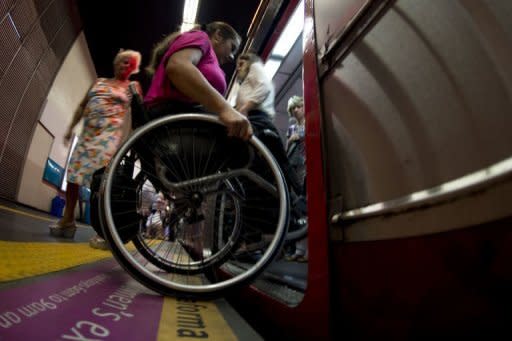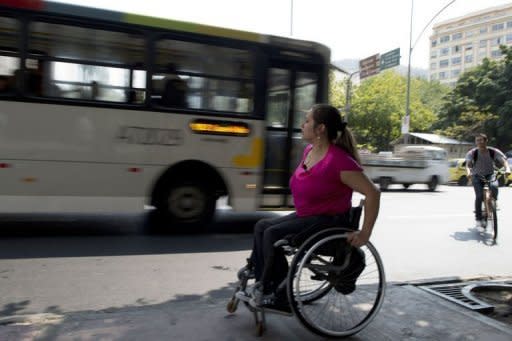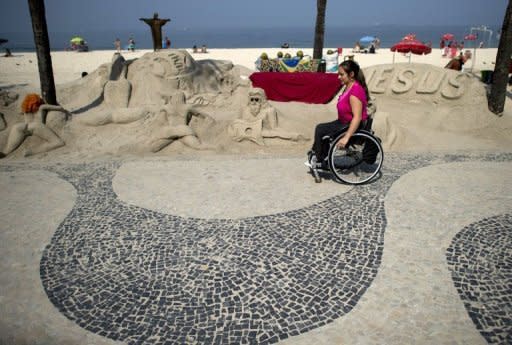The "paralympic" nightmare of a Rio disabled athlete
For Viviane Macedo, Brazil's five-time wheelchair dancing champion, the Rio Paralympics won't have to wait until September 2016. She is already trying to tango with the challenges right here and now, in this city where virtually nothing is done to meet handicapped people's needs. At a bus stop, several buses whizzed by, ignoring her. Those that do stop are not equipped to lift her wheelchair. For the 35-year-old Macedo, getting around this metropolis of 6.5 million people, which will host the Summer Olympics and Paralympics four years from now, is a daily nightmare. Indeed, challenges facing the disabled here run the gamut from subway elevators breaking down a lot, to sidewalks being uncommon, and often pocked with potholes. That makes it hard for anyone in a wheelchair to get around. Meanwhile traffic lights rarely have sound features for the blind, and taxi drivers often refuse to take clients in wheelchairs. "It is virtually impossible for me to get on a bus in this city," said Macedo, who had to move to the Copacabana district to be able to use the subway, which only runs on two lines and covers part of the tourist area. And she does not know whether she will be able to stay in the district much longer, given the skyrocketing real estate prices fueled by an oil boom and the approaching 2014 World Cup and 2016 Summer Olympics. Her rent soared 100 percent in one year. She gets no state aid and is suing city authorities to try to get a computerized prosthesis which costs around $30,000. Macedo forgets her misery only when she goes dancing the samba or the zouk (a popular French Caribbean dance) or when she teaches her sport to handicapped children. Wheelchair dancing is not a paralympic sport, but she hopes that the Rio Paralympics, in which 4,200 athletes from 150 countries will compete, will leave a lasting legacy for all of Rio's disabled. Only half of the city's bus fleet is adapted to carry the handicapped, compared with 100 percent in London, which has just staged very successful Paralympics. Rio city officials have pledged that the BRT (Bus Rapid Transit) system for the 2016 Olympics will be adapted for people with reduced mobility. But in the Barra da Tijuca district where those buses have begun operating, access ramps are too steep, said Teresa Amaral, president of the Brazilian Institute for the Rights of the Disabled. "Blind people in Rio are risk-takers. One of my blind friends died, and was run over by a car as she was crossing the street opposite the Blind Institute, where the city's only traffic lights equipped with a sound alarm for the blind is located," she says. On his return from London with the paralympic banner, Rio Mayor Eduardo Paes vowed that things will change. "All (Rio residents) must commit to making this city an accessible and welcoming place for the handicapped," he said. Brazilian paralympians shone in London, winning 43 medals, the seventh biggest haul among participating nations. "The disabled athlete often experiences a moment of glory but when he returns home, he must face a harsh reality: he has no job and his rights are not respected. After winning gold, some even go hungry," said Amaral. Brazilian Viviane Macedo, 35, gets in a metro car at a station in Rio de Janeiro. Challenges facing the disabled here run the gamut from subway elevators breaking down a lot, to sidewalks being uncommon, and often pocked with potholes. Brazilian Viviane Macedo, 35, is seen in Rio de Janeiro. Wheelchair dancing is not a paralympic sport, but champion Macedo hopes that the Rio Paralympics, in which 4,200 athletes from 150 countries will compete, will leave a lasting legacy for all of Rio's disabled. Brazilian Viviane Macedo, 35, rides her wheelchair at Copacabana beach in Rio de Janeiro. Only half of the city's bus fleet is adapted to carry the handicapped, compared with 100 percent in London, which has just staged very successful Paralympics.


